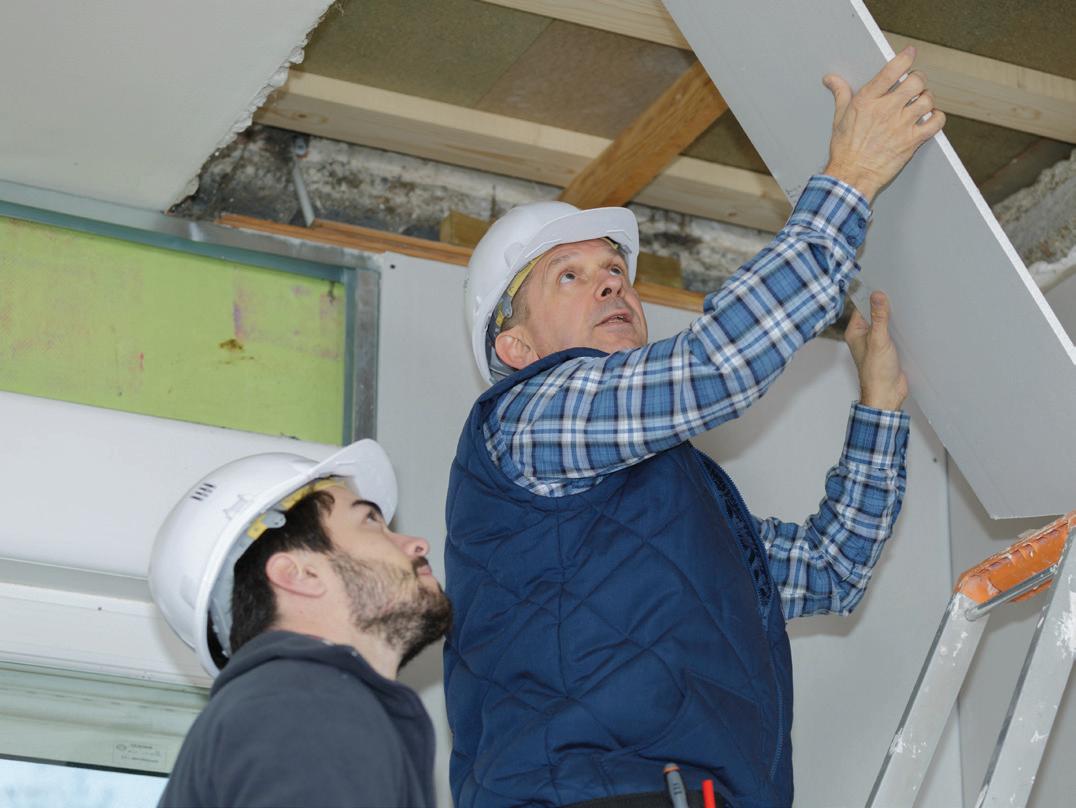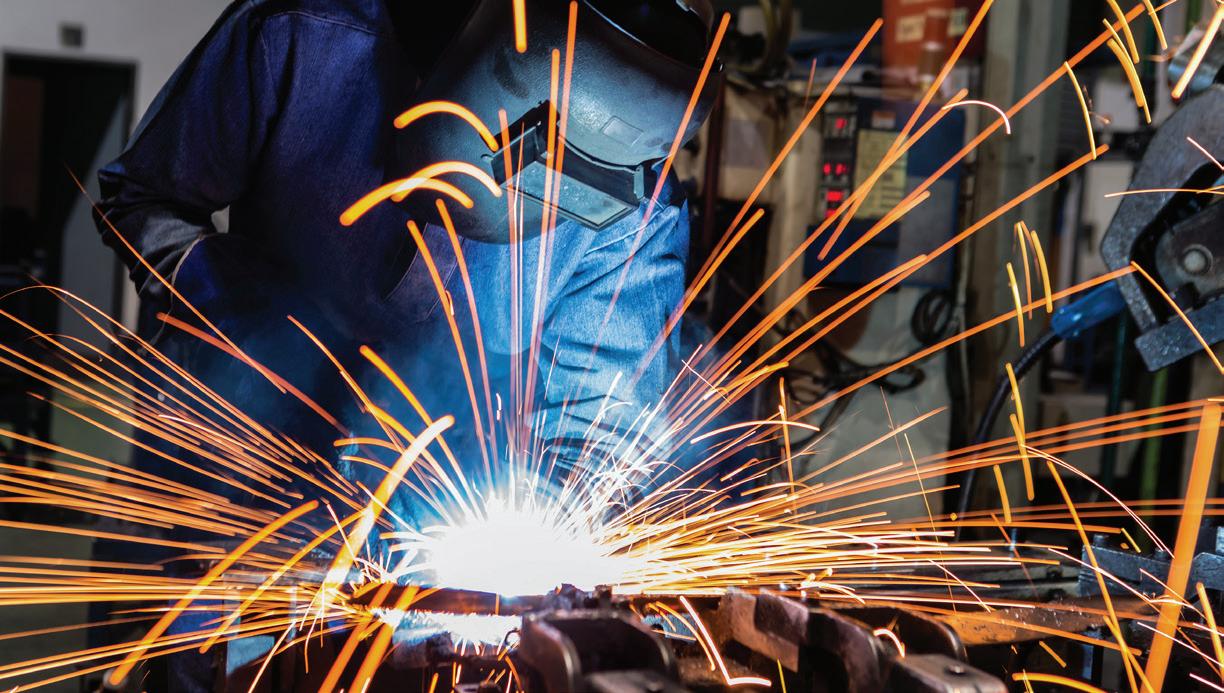












Air Conditioning Technology
Building Maintenance
Carpentry
Electrical Systems
Green Building Technology
Masonry
Plumbing
Residential Energy Efficiency
Sustainable Renewable Alternative Energy
Technical Studies
Welding/Joining Technology
For up-to-date program offerings, please refer to the Albany Technical College website at www.albanytech.edu/areas-of-study
Albany Technical College is accredited by the Commission on Colleges of the Southern Association of Colleges and Schools to award Associate of Applied Science Degrees. Contact the Commission on Colleges at 1866 Southern Lane, Decatur, Georgia 30033-4097 or call 404-679-4500 for questions about the accreditation of Albany Technical College.




Technical Studies
Air Conditioning Technology
Air Conditioning Electrical Technician
Air Conditioning Repair Specialist
Air Conditioning Technician Assistant
Industrial /Commercial Air
Residential Air Conditioning Technician
Air conditioning technicians keep heating and air-conditioning systems working to control the temperature, humidity, and air quality in homes, businesses, industrial plants, and other buildings. Heating, air-conditioning, and refrigeration mechanics and installers—also called technicians—install, maintain, and repair the refrigeration systems for storing and transporting food, medicine and other items. Because heating, ventilation, air-conditioning and refrigeration systems are sometimes rolled into one― Heating Ventilation Air Conditioning and Refrigeration (HVACR) systems.
Students in the Air Conditioning Technology program learn the principles of air conditioning systems, heating service and installation, and design of heating and air conditioning systems. They get the hands-on training needed to enter the workforce and succeed in the HVACR industry, including commercial and industrial refrigeration, heat pumps, air conditioning systems, fundamentals of electricity, and electric motors and controls. They also will develop skills in the areas of work ethics, air conditioning theory, and the occupational skills needed for employment in the HVAC industry.
Program graduates receive an Air Conditioning Technology diploma and five Technical Certificates of Credit, including Air Conditioning Technician Assistant, Industrial/Commercial Air, Air Conditioning Repair Specialist, Air Conditioning Electrical Technician, and Residential Air Conditioning Technician. Students who complete these programs will have the qualifications to find work as air conditioning technicians, refrigeration technicians, installers, sales reps and parts distributors.
Want to broaden your opportunities for education and employment? Students will be able to apply what they learned in the Air Conditioning Technology program and follow up with Albany Tech’s Building Maintenance or Electrical Construction, giving them an added edge and a boost in employability.
Building & Facilities Maintenance
General Maintenance Mechanic
Building and facilities maintenance involves many different trades, such as electrical, carpentry, plumbing, painting and heating, ventilation and air conditioning (HVAC). Because older buildings and equipment will always require repairs, updates, or renovations, students in this program learn how to repair and maintain the important equipment systems in such buildings, including both residential and light industrial facilities, as well as learning the skills needed for maintenance and repair of the fixtures and appliances in those buildings.
This program is ideal for people who like solving problems, working with their hands, and using basic tools to fix mechanical, electrical or plumbing issues. Technicians in this field often handle the fabrication of walls, installation of doors and windows, paint selection and preparation, basic plumbing installation and troubleshooting and the regulation of air quality, temperature and humidity in building interiors. Among the skills taught are the basics of refrigeration and building climate controls, commercial and residential wiring, DC and AC motors, and basic plumbing. Also included are the basics of HVACR electrical systems and motors, among other topics.
Program graduates receive a Building and Facilities Maintenance diploma and a General Maintenance Mechanic certificate. Students who complete these programs will have the qualifications of a technician necessary for entry-level jobs in a non-manufacturing maintenance setting such as apartment complexes, hotels, schools, and hospitals.
After completing the Building and Facilities Maintenance program, graduates can choose more in-depth instruction in some of the areas covered by taking additional courses in programs such as electrical, air conditioning, plumbing, carpentry, and masonry.







Technical Studies
Carpentry
Carpentry Fundamentals
Advanced Carpentry
Carpenters work in both the residential and commercial industries and construct, repair, and install building frameworks and structures made from wood and other materials. These hands-on jobs require employees to know how to follow blueprints and building plans and codes; install windows and molding; measure, cut, and shape wood, plastic, and other materials; and build frameworks, including walls, floors, and doorframes; erect, level, and install building framework with the aid of rigging hardware and cranes; inspect and replace damaged framework or other structures and fixtures; and instruct and direct laborers and other construction helpers
Completion of the Carpentry program offers graduates a wide variety of jobs in the construction industry, from insulating office buildings to installing drywall or kitchen cabinets in homes. To complete those tasks, carpenters use many different tools to cut and shape wood, plastic, fiberglass, or drywall. They commonly use hand tools, including squares, levels, and chisels, as well as many power tools, such as sanders, circular saws, nail guns, and welding machines. Many employers
require applicants to supply their own tools. Students in this program will learn about foundations, floors, walls, ceilings, roofs, and interior and exterior structures, including windows and stairs.
Program graduates will receive a carpentry diploma and 9 Technical Certificates of Credits. - Carpentry Diploma, TCC- Construction Career Launch, Construction Career Launch Safety, Construction Career Bluepoint, Finish Carpentry, Certified Construction Worker, Cabinetmaking Assembly Technician, Cabinetmaking Installation Technician, Flooring Installation Technician. They will have the qualifications of an entry-level residential carpenter or entry-level commercial carpenter.
Technical Studies
Electrical Construction and Maintenance
Basic Electrical Systems Technician
Intermediate Electrical Systems Technician
Those individuals interested in how electricity is generated and then travels from the power plant to homes and businesses might consider a career in electrical construction. Electricians install and maintain all of the electrical and power systems for homes, businesses, and factories. They install and maintain the wiring and control equipment through which electricity flows, including electrical equipment and machines in factories and a wide range of other businesses. Electricians are used for wiring new homes, restaurants, schools, and other structures, including older buildings that need improvements to their electrical systems to meet modern building and occupancy codes.
Students enrolled in the Electrical Systems Technology program will develop skills to work safely in a residential or commercial environment and be prepared to inspect, install, maintain and repair electrical systems. They will learn about direct and alternating circuits, how to interpret electrical prints and schematics, how to wire structures, and how to maintain their operation while applying the National Electric Code.
Program graduates receive a diploma in Electrical Systems Technology, TCCElectrical Systems Assistant, Commercial Wiring, Photovoltaic Systems Installation and Repair Tech. Graduates can begin entry-level jobs in residential or commercial electrical construction. The majority of electricians are employed by electrical contracting firms, while others work in a variety of industries. About 10 percent of electricians are self-employed.








The Green Building Technology diploma program is designed to prepare students for a future in the growing field of weatherization and energy efficiency assessment for new and existing houses and buildings. Improving the energy efficiency, health and safety, comfort, and durability of both new and existing homes and buildings is emphasized.
Students are taught to conduct comprehensive building performance evaluations, assessments, analysis, and testing to determine appropriate performance improvements. The Green Building Technology program includes applied handson building diagnostics, commissioning, energy auditing and modeling, and weatherization retrofit strategies useful in the green building industry.
Upon completion of the program, students will be able to apply building science principles and practices to the design and construction of both new and existing homes to help improve the energy efficiency, comfort, indoor air quality, and durability of the house; perform energy audits and assessments; conduct a comprehensive house inspection and diagnostic analysis of a house using state-of-the-art diagnostic tools; and analyze the economics of weatherization improvements and energy-efficient retrofits to existing buildings among other tasks.
The program is designed for individuals wanting to enter the energy efficiency assessment and retrofit industry, and for contractors wishing to work towards becoming certified weatherization technicians, and/or energy auditors. This program will prepare students to take the HERS national rater exam and the BPI building analyst exam.
Graduates will receive a Green Building Technology diploma.
Technical Studies
Masonry
Advanced Masonry
Basic Masonry
Masonry Technology
Those who enjoy working with their hands and learning basic construction skills might consider a career in masonry. The work of a mason varies, from laying a simple masonry walkway to installing an ornate exterior on a high-rise building. Workers cut or break the materials used to create walls, floors, and other structures. Once their building materials are properly sized, they are laid with or without a binding material. Workers use their perceptions and a variety of tools to ensure that the structure meets the desired standards. After they finish laying the bricks, blocks, or stone, the workers clean the finished product with a variety of cleaning agents.
Brickmasons generally build and repair walls, floors, partitions, fireplaces, chimneys, and other structures with brick, precast masonry panels, concrete block, and similar masonry materials. Some brickmasons specialize in areas such as installing firebrick linings in industrial furnaces. The Masonry program teaches students basic construction, and basic and advanced skills in masonry and bricklaying, including how to construct and form footings, foundations, columns, and floor and wall framing.
Program graduates will receive a masonry diploma which qualifies them as a one-year apprentice brick and block mason or as a one-year apprentice tile setter. These qualifications open opportunities for employment with contractors and businesses such as LRA Constructors and Benton’s Masonry, among others. Graduates from this program are often hired for construction projects such as schools, hospitals, apartment buildings, and other structures.
After completing the Masonry program, students might choose to continue their education by enrolling in the Carpentry program.








Plumbing
Advanced Plumbing Technician
Intermediate Plumbing Technician
This program offers the combination of plumbing theory and practical application necessary for successful employment as a plumber apprentice, an entry-level plumber that will begin their career under the guidance of a more experienced tradesman. Students in the Plumbing program will develop skills to work efficiently and safely in the plumbing industry. They typically perform many of the same tasks that veteran plumbers do, including installing new plumbing fixtures, unclogging plumbing systems, and repairing pipes. They may handle easier jobs on their own and act as a helper on more complex jobs.
Hands-on training teaches students how to inspect, install, maintain, and repair plumbing systems in commercial and residential settings. Among the skills taught in this program are how to interpret codes, blueprints, sketches, drawings, and schematics. Students will also learn how to install, repair, and maintain pipes, drain systems, water supply systems, plumbing fixtures, gas heating, venting, and appliances. Program graduates will receive TCC-Plumbing Services and System Specialist.
Plumbers Assistant
Plumbing Technician
Residential Energy Efficiency Technology
One of Albany Tech’s newest program offerings, the Residential Energy Efficiency Technology program introduces students to the ideas and practices behind the sustainable construction movement. Students are introduced to the methods and philosophies behind green building and energy-efficient residential structures becoming more mainstream in the construction industry today. Classroom lecture is combined with real hands-on experience gained from the inspection of existing homes. The program includes a live-work component that provides students an opportunity to learn real world skills while performing testing and calculations on actual homes.
Students will learn to conduct and prepare a home energy audit, best procedures to air seal a building and how to interpret local and national building, energy conservation or green building codes. The course will also cover the fundamentals of solar technologies for residential building, including solar generator electricity and photovoltaic. The curriculum mirrors that required by Building Performance Institute Inc. (BPI) to achieve BPI certifications. Graduates should complete a week-long certification course with an approved BPI test center to achieve the BPI Building Analyst Certification.
Graduates of this program will receive a Residential Energy Efficiency Technology diploma. They will be prepared for employment as weatherization technicians, energy specialists, energy auditors, field inspectors, and energy star inspectors/ raters, among other positions.







Technical Studies
Sustainable Renewable and Alternative Energy
Basic Electrical Technician
Electrical Systems Assistant
Photovoltaic Systems installation and Repair Technician
The Sustainable Renewable and Alternative Energy diploma program concentrates on Solar Photovoltaic (PV) and Small Wind Technology (50 kW/h and smaller). This program prepares students for entry-level positions in the field of renewable energy technicians and technical maintenance. Emphasis is placed on “green” technologies including electricity, wind, photovoltaics, solar thermal, energy efficiency, and smart grid technology.
Students develop the practical skills needed to install, troubleshoot, and maintain photovoltaic, wind turbines, and solar thermal systems. The course work includes theory and lab practice in energy fundamentals, sustainability, construction practices, electrical currents, and energy measures and efficiency. Upon completion of the program, students will be able to properly select and install a solar thermal or wind energy system on a variety of sites; inspect, troubleshoot, and repair an existing solar thermal system; conduct a site analysis, including load analysis; and demonstrate proper methods for electrical wiring of solar arrays/ systems (AC and DC) among other tasks.
Graduates of this program will receive a Sustainable Renewable and Alternative Energy diploma and will be prepared to take the North American Board of Certified Energy Practitioners (NABCEP) Entry Level Exam. Solar and wind industry employers look for this credential when hiring employees.
The Technical Studies associate degree program provides Albany Technical College students the opportunity to a well-rounded introduction to technical courses. It will prepare them for entry-level employment in a variety of fields as well as provide the student with core courses that will transfer to a 4-year college if the student desires continuing education. Many traditional technical areas, such as Welding and Electrical Construction, now require a greater breadth of general knowledge to be successful. By increasing the number of General Studies courses students take, students will gain more communication skills, thinking and problem-solving skills, core technology skills, and interpersonal skills. Acquiring these skills makes these students much more likely to be qualified for promotions, management opportunities, and even business ownership. The Technical Studies Degree is a good option for students hoping to pursue a bachelor’s degree in the future.
Students entering this field will have opportunities to gain job-related skills quickly in a hands-on learning environment. Students will gain valuable workplace experience while completing the courses. Technical Studies can lead to many career options.
The Associate of Applied Science in Technical Studies program allows students who receive a diploma or certificate to take additional general education course work to obtain a degree. This gives students additional skills that can be used in possible business ownership and management.








Technical Studies
Welding & Joining Technology
Advanced Shielded Metal Arc Welder
Basic Shielded Metal Arc Welder
Flux-Cored Arc Welder
Gas Metal Arc Welder
Gas Tungsten Arc Welding
Vertical Shielded Metal Arc Welder Fabricator
Welding plays a critical role in the strength and durability of everything, from cars to heavy industrial machinery to bridges. The Welding/Joining Technology program is one of Albany Tech’s longest-running programs, meeting demand throughout the region and beyond for entry-level welders/fabricators or support industry employees. The most common and simplest type of welding today is arc welding, which uses electrical currents to create heat and bond metals together, but there are over 100 different processes that a welder can employ. The type of weld used is normally determined by the types of metals being joined and the conditions under which the welding is to take place.
Entry-level skills taught in this program include operation and manipulation of oxyfuel/plasma cutting equipment, shears, brakes, drills, and grinders. Students will also learn the four processes while implementing blueprint reading skills and layout techniques with various measuring and hand tool equipment. Those processes include shielded metal arc welding (SMAW), gas metal arc welding (GMAW), tungsten inert gas (TIG) welding (GTAW), and flux-cored arc welding (FCAW).
Albany Tech recently added three state-of-the-art welding simulators to the program, enabling students to gain valuable skills at a much faster rate due to the prep time needed to set up for traditional welding training. In addition, modern inverter welders were purchased to replace those that were outdated, giving students in this program every possible advantage for learning.
Program graduates receive a Welding and Joining Technology diploma, have the qualifications of a welding and joining technician, and are prepared to take qualification tests. The program offers Technical Certificates of Credit in FCAW, GMAW, GTAW, SMAW, advanced SMAW, intermediate welder, and advanced welder.
Many graduates that earn a Welding and Joining Technology diploma choose to pursue additional engineering training with a welding background.


ATC uses the Accuplacer-Next Generation exam for measuring proficiency in reading, writing and math. Applicants must achieve minimum admissions scores on the exam as specified in the program state standards or acceptable scores on a statistically validated test such as the SAT or ACT. Program-specific entrance scores are a minimum requirement, and higher scores may be required. Reasonable accommodations are made during testing for those who need them. (The examiner should be notified prior to testing.)
ATC offers several types of financial assistance to help qualified applicants pay for their education. Funds are available through the Federal Pell Grant, the Federal Supplemental Educational Opportunity Grant, Federal Work-Study and the Georgia HOPE programs. Students may also receive assistance through the Job Training Partnership Act, operated by the Georgia Department of Labor, or the Veterans Educational Assistance Program, administered by the Department of Veteran’s Affairs. Sufficient financial assistance is available to provide the opportunity for eligible students to attend college. Grant and scholarship programs operate on an award-year beginning in August and ending in July. Students must apply or re-apply each year to receive or continue to receive financial aid.






We measure our success by your success.
Albany Technical College (ATC) is a public two-year institution committed to providing higher education and life-long learning opportunities that promote self-sufficiency, economic development, and community growth and sustainability. ATC prepares students and graduates to meet dynamic and evolving workforce needs, utilizing industry-driven teaching and learning approaches including traditional, online, and customized business solutions. ATC offers over 200 certificate, diploma and associate degree programs designed to provide students with the most marketable skills for the fastest-growing fields and professions. We stand behind that promise by providing a warranty for all our graduates. Any graduate who does not meet the program standards will be re-educated at no cost to the graduate or to the employer.
Albany Tech is charged with providing education opportunities to the residents, businesses and industries within a seven-county service delivery area. These counties include Baker, Calhoun, Clay, Dougherty, Lee, Randolph and Terrell. Today, more than 3,000 full-time students are enrolled in credit programs per semester. Another 2,500 are enrolled part-time and in seminars, continuing education courses, teleconferences and customized business training. All of our graduates receive job placement services from our Career Services department. The result? Ninety-eight percent of our graduates are employed.
